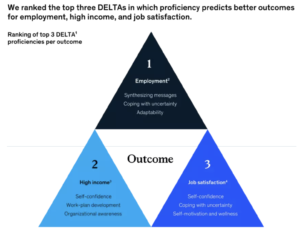 One of the ways that schools and districts are exercising a future-focused mindset is to develop a Portrait of a Graduate. (If you are interested in this work, check out the https://portraitofagraduate.org site for resources and see lots of quality examples from around the country.)
One of the ways that schools and districts are exercising a future-focused mindset is to develop a Portrait of a Graduate. (If you are interested in this work, check out the https://portraitofagraduate.org site for resources and see lots of quality examples from around the country.)
In the process of developing a Profile, the question being answered is…
What knowledge, skills and dispositions do our graduates need?
This requires us to think about all the learners in the system…Kindergarten through Grade 12. In an exponential work, a decade+ is a wide span to consider.
Creating a Profile is a challenging but worthwhile process…and I would encourage all learning organizations to have these conversations.
Once a customized Profile is designed, it’s even more challenging to implement! It can easily become like the old “strategic plan”… an exercise that results in a nice graphic that ends up being….a nice graphic.
Maybe that’s for another post!
But in this post, I wanted to share a recent report from McKinsey on the skills needed for the future of work.
One caveat….while I think we would agree the goal of human-centered schooling is not to produce workers for jobs, it is one aspect, so I think this resource is useful to ignite conversation around an important function of schooling…important but not the sole function.
When you look at the complete list of skills, I think you will see, too, that many of them apply to life beyond the job.
You can read more about the specific methodology here, but they essentially identified 56 foundational skills (what they called DELTAs or distinct elements of talent–a mix of skills and attitudes) across 13 skills groups and 4 categories. (Graphic at the link above.)
One of the interesting outcomes of the research was the identification of the top 3 DELTAs for each of the following: Employment, High Income and Job Satisfaction.
Employment:
- Synthesizing messages
- Coping with uncertainty
- Adaptability
High Income:
- Self-confidence
- Work-plan-development
- Organizational awareness
Job Satisfaction:
- Self-confidence
- Coping with uncertainty
- Self-motivation and wellness
“Our findings help define the particular skills citizens are likely to require in the future world of work and suggest how proficiency in them can influence work-related outcomes, namely employment, income, and job satisfaction.”
The report then goes on to suggest three actions, one of which is…
Reform Education Systems
And this is where the outcomes could be helpful for schools and districts engaged in Profile of a Graduate work.
I think it’s a decent start and worth considering. I also think it’s important that the conversation moves beyond the idea of school as a factory for creating workers…in the case of the report…workers who generate high income. We could certainly debate the importance of such a qualifier.
One final thought: It’s interesting that a few of the most needed DELTAs encompass adaptability, agility and the ability to face uncertainty.
No doubt, we are in increasingly uncertain times. We are just exiting a period where we had some good practice in developing and exercising these skills.
Makes me wonder:
How are we preparing our learners to manage uncertainty and become adept at adaptability?
- A silver lining - January 22, 2022
- Is our use of tech working against us? 🤔 - September 8, 2021
- What’s NOT going to change in the next 10 years? 🤔 - September 7, 2021